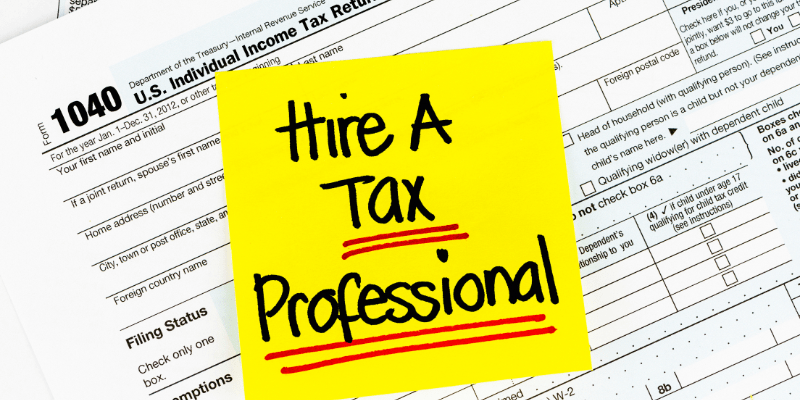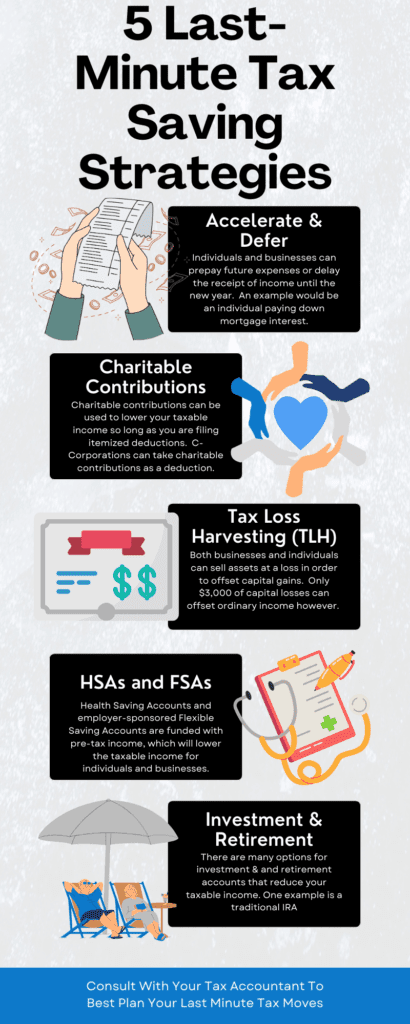

There are numerous tax saving strategies that individuals and businesses can reduce their taxable income before 2024 arrives. In this article we will break down how you can reduce your taxable income for 2023 taxes and the considerations when doing so. Remember to always consult with your tax accountant to best plan for your unique financial situation.
Both businesses and individuals have some options to accelerate their expenses paid and delaying income to provide a temporary tax benefit. This strategy has heavy future tax and accounting implications, and we recommend you consult with your tax accountant to discuss how best to achieve your desired results.
Deferring income involves pushing off the receipt of income into the next year instead of taking it in 2023. By doing this, individuals and businesses may be able to avoid entering a new tax bracket or stay under an income threshold to receive more favorable deductions.
An example of this might be an individual asking their employer to postpone a bonus into the new year or holding on to assets you plan to sell into the new year arrives. A business might delay billing a client until the next year or institute an installment plan to spread the revenue out into the new year.
When accelerating expenses individuals and businesses are taking deductible expenses in the current tax year in order to reduce taxable income in the current year rather than the next year. This strategy reduces taxable income in the year of which these expenses are paid but prevents them from being deducted in the proceeding year.
For individuals, this might look like paying down on mortgage interest or paying for non-reimbursed medical procedures if you are itemizing your expenses this year. Businesses could pre-pay future expenses, pay out upcoming employee bonuses, or purchase deductible equipment.
Although these strategies may lower your taxable income this year, they often kick the proverbial can down the road.
For businesses who file using the accrual method, prepaid expenses would be split out into their rightful periods regardless of when the actual cash is spent.
Not all equipment can be deducted immediately using Section 179 “Bonus Depreciation”.
Many of the eligible expenses for individuals can only be taken if they file itemized deductions rather than the more simple standard deduction.
– Although these strategies may lower your taxable income this year, they often kick the proverbial can down the road.
– For businesses who file using the accrual method, prepaid expenses would be split out into their rightful periods regardless of when the actual cash is spent.
– Not all equipment can be deducted immediately using Section 179 “Bonus Depreciation”.
Both businesses and individuals can make charitable deductions that may be eligible to reduce your taxable income. Only C-Corporations can directly take the deduction for themselves. Pass through entities can take charitable contributions the business donated through their personal tax returns in the same proportion as their ownership in the business.
The value of services or time are not viable deductions according to the IRS.
Documentation is required in order to claim any charitable deductions.
Both businesses and individuals can make charitable deductions that may be eligible to reduce your taxable income. Only C-Corporations can directly take the deduction for themselves. Pass through entities can take charitable contributions the business donated through their personal tax returns in the same proportion as their ownership in the business.
You can only reduce your income by $3,000 more than your net capital gains.
Additional losses past the $3,000 reduction in regular income will carry over to future return years.

Health Saving Accounts (HSAs) are contributed to with pre-tax income, reducing an individuals total taxable income by the same amount as was contributed. The funds in these accounts can be used to cover eligible medical expenses further down the line. The amount that can be contributed to HSAs are limited each year based on several factors.
Flexible Spending Accounts (FSAs) are typically employer sponsored plans that reduce the taxable income by a set amount of contributions per employee. These contributions for FSAs are made through payroll deductions.
HSA contributions add a little complexity to tax returns
There are a large amount of investment and retirement vehicles that can reduce taxable income for both businesses and individuals. These strategies range from traditional IRAs to corporate 401Ks. The breakdown and restrictions of each of the investment and retirement accounts is a great topic for another day. Suffice it to say that many of these options are excellent ways to reduce taxable income quickly and provide great future benefits. Financial advisors like The Advisors are well suited to help you set up and manage these types of investment and retirement accounts.
There are several powerful strategies that can be implemented in order to reduce taxable income for your 2023 taxes. Even though time is quickly running out to make these strategy tax moves, you can still consult with your tax accountant and find the optimal path.

